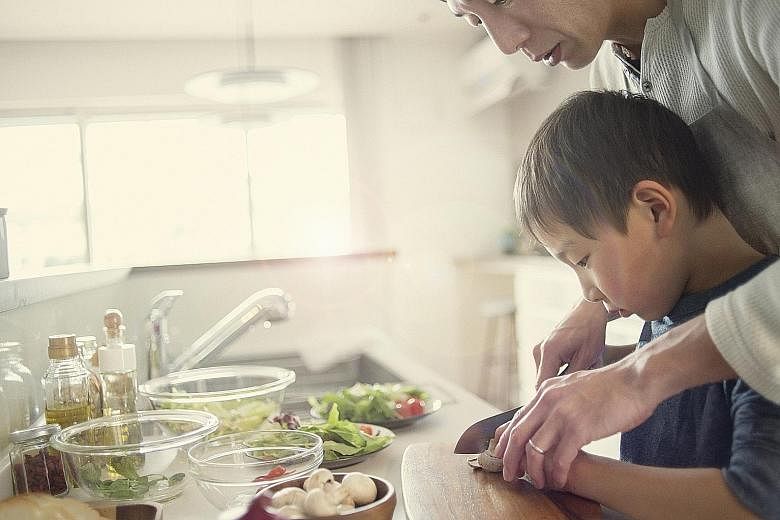NEW YORK • Should you feed your kid's interest if he seems to be fascinated by what goes on in the kitchen?
However, parents also wonder if this part of the house is safe for young children. Here is a guide.
Younger than two: At this age, it is all about exposure. Let them watch you from a safe spot, such as a high chair, a playpen or a blanket on the kitchen floor, away from hot pans and spills.
Give them unbreakable kitchen tools such as wooden spoons and plastic measuring cups.
Ages two to three: Before cooking, always ask your child to wash his hands - this is an important habit to cultivate.
Expect mess. Little children are completely unconcerned about the state of the kitchen floor and their coordination might propel ingredients towards undesirable locations.
Age-appropriate tasks include washing produce, kneading dough and spreading butter or cream cheese on bread.
You can also assign tasks such as measuring, pouring and stirring items such as beans, oatmeal or flour.
Ages four to six: At this stage, they can begin to use real cooking tools, although they should still stay away from a hot stove or oven.
Age-appropriate tasks include peeling fruit, mashing beans and switching the blender on and off, with you nearby.
Cookies, cupcakes and other baked treats are easy and appealing for beginner cooks.
Ages seven to nine: You know your child best: Is he calm and responsible or still fairly impulsive and easily distracted?
Your assessment will determine which tasks you believe he can safely perform, such as grating cheese, ladling soup into bowls and cutting a bigger variety of foods with a sharper knife.
Introduce the stove.
Begin with recipes such as oatmeal or scrambled eggs that do not require a pot of boiling water or sizzling oil.
Teach your children to roll up their sleeves and pull back their hair so neither gets near the fire.
Kids this age can usually read, so work with simply written recipes.
Ages nine to 12: Children at this stage can make an entire meal from recipe selection to serving.
Stay in the kitchen until your child has exhibited competence and an understanding of kitchen safety.
Teach them to make a grocery list from recipes.
Review oven and stove safety.
Practise knife skills, such as how to chop, dice and mince.
Teach about food safety such as how to store fruit, vegetables and cooked foods for freshness and longevity.
If your child finds himself wanting more, consider a cooking school. Many have parent-child classes, teen seminars, birthday parties and summer camps.
The earlier kids start cooking in the kitchen, the better they will be able to take care of themselves.
And parents can also count on their help in making dinner.
WASHINGTON POST

